Ozempic Foods to Avoid: 7 Things You Can’t Eat on Weight-Loss Drugs

Weight loss drugs such as Ozempic, Wegovy, and Zepbound can lead to substantial weight loss—an average of 15 percent of one’s body weight in 15 months, according to new studies. But the medication alone is not responsible; it’s also the lifestyle changes that come along with the regimen, including the foods to avoid on Ozempic. Keep reading to learn what the pros say you should skip and why (it’s not just about weight loss!).
RELATED: What Is “Ozempic Face” and How Do You Treat It?
What Is Ozempic?
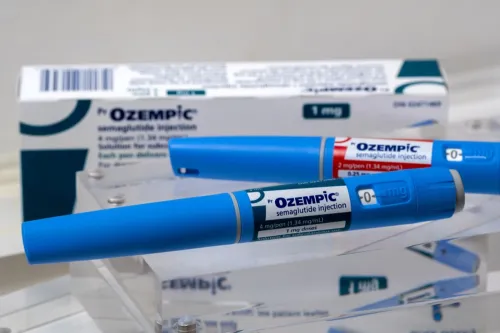
Ozempic is a drug with two Food and Drug Administration-approved (FDA) uses. In 2017, it was approved to treat diabetes; four years later, it was approved to treat obesity under the brand name Wegovy.
The drug falls under the category of semiglutides. These drugs lower blood sugar levels and imitate a naturally occurring hormone called GLP-1 that signals our bodies to feel full and causes our stomachs to empty more slowly. Because of that full feeling, people on semiglutides tend to lose weight faster.
Wegovy is approved for “chronic weight management in adults with obesity or overweight with at least one weight-related condition (such as high blood pressure, type 2 diabetes, or high cholesterol),” according to the FDA.
What Is the Relationship Between Ozempic and Diet?
The FDA notes that Ozempic should be used alongside a “reduced calorie diet and increased physical activity.” That’s not just to get the best results, either—patients say eating the wrong things could trigger unpleasant reactions.
“Eating foods that you should limit or avoid while taking Ozempic can exacerbate some side effects like nausea, vomiting, and diarrhea,” says Ana Reisdorf, registered dietitian and founder of The Food Trends. “The medication slows gastric emptying, making it harder for your body to process these foods efficiently.”
If you eat the suggested foods, you’ll likely experience fewer tummy troubles and achieve your weight loss goals faster. Plus, you’ll ensure you’re fueling your body with healthy nutrients versus empty calories, especially since you’ll be eating less.
RELATED: 7 Worst Ozempic Side Effects Reported by Patients.
Foods to Avoid While Taking Ozempic
1. Greasy, high-fat foods
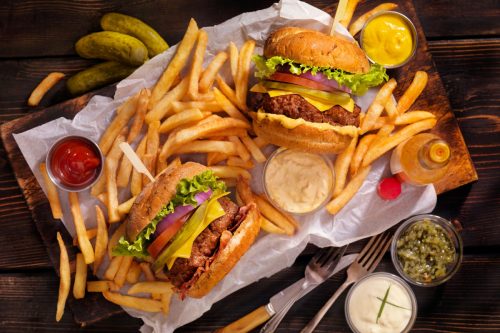
Avoiding greasy, high-fat, and fried foods should help you lose weight—especially if you steer clear of unhealthy, saturated fats. However, that’s not the only reason to take these items off the menu.
Novo Nordisk, the maker of Ozempic and Wegovy, recommends not eating “fried” or “greasy” foods to avoid some of the drugs’ most common side effects.
“These drugs slow gastric emptying, which, when combined with fatty foods, may lead to symptoms like nausea, vomiting, diarrhea, and abdominal discomfort,” explains Phyllis Pobee, MD, CCFP, ABFM, a board-certified weight loss physician through the American Board of Obesity Medicine.
2. High roughage foods
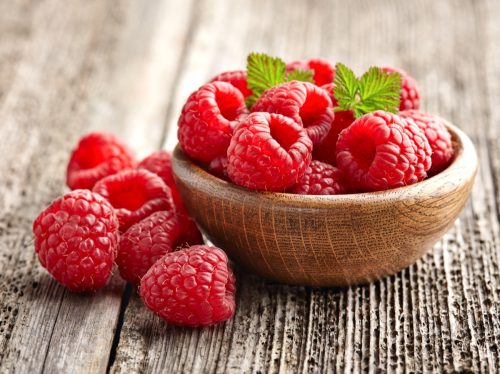
“High roughage” means that there’s a lot of fiber in something—and fiber takes a long time for the body to digest.
“All the GLP-1 drugs slow down and delay gastric emptying, so that could cause a problem,” says weight-loss doctor Sue Decotiis, MD. “However, foods that have high roughage tend to be healthy foods, so they should not be completely avoided; just eat them in small quantities.”
She adds that’s not a problem for people on these drugs because they don’t have a big appetite. These foods include raspberries, pears, apples with the skin on, green peas, broccoli, and Brussels sprouts, according to the Mayo Clinic.
3. Foods with refined carbs and added sugar

Refined carbs and added sugars are also best avoided while taking weight loss drugs.
“Foods high in refined carbs and sugars can counteract the weight loss effects of these medications,” Pobee says. “Since these drugs are designed to improve insulin sensitivity and reduce appetite, consuming high-sugar foods can lead to spikes in blood sugar and cravings, undermining the medication’s benefits.”
This includes sugary drinks, adds Krutika Nanavati, RDN, a registered dietitian and nutritionist working with Clinic Spots. “Sugary drinks can cause blood sugar spikes, which can counteract the appetite-suppressing effects of GLP-1 drugs. They can also lead to cravings and hinder weight loss progress,” she explains.
4. Foods that cause gas and bloating
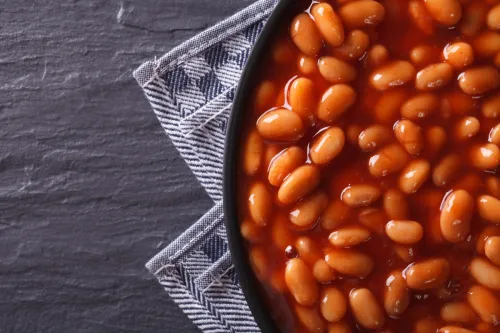
Because of the slowed gastric emptying on Ozempic, foods that cause bloating could impact you for longer than usual.
“However, many foods that cause bloating do so because they have fiber—and fiber is quite important for the gut biome and to reduce quick absorption of sugars and fructose,” says Meredith Warner, MD, a Baton Rouge orthopedic surgeon and founder of Well Theory. “If you find a particular high-fiber food that causes a lot of bloating, perhaps eliminate that food initially, but then reintroduce it slowly and in smaller amounts as tolerated.”
You don’t want to cut fibrous foods entirely.
5. Excessive Alcohol

Many people find that weight loss drugs curb their cravings for booze and other stimulants, making it easier to cut back on their alcohol consumption. This is great news since drinking can come with negative consequences while taking weight loss medication.
“Alcohol should be limited or avoided,” urges Pobee. “These weight loss drugs can enhance the effects of alcohol or lead to unexpected reactions, increasing the risk of hypoglycemia (low blood sugar) in those with diabetes and amplifying potential side effects like dizziness or nausea.”
6. Spicy food
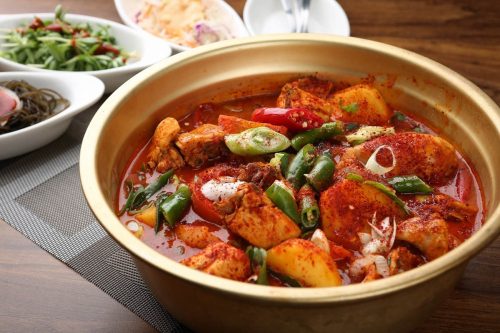
Spicy foods are a crowd favorite—but beware before diving into a full plate of it.
“They can irritate the stomach and cause a burning sensation that is uncomfortable, and because Ozempic slows down the rate of gastric emptying, this sensation may linger,” says Warner. “But unless the spice in foods is such that you have an unpleasant feeling after eating them, there should really not be a problem while on this medication.”
7. High-Sodium Foods
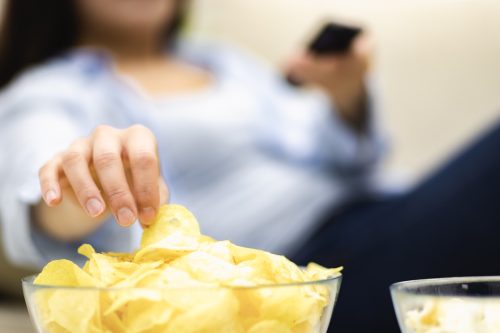
In the short term, high-sodium foods can lead to water retention and temporary weight gain. However, consuming too much salt is also a “driver” of bigger-picture weight gain, says a 2018 study published in the journal Nature Reviews Nephrology.
“Long-term ingestion of a high-salt diet is also associated with obesity, insulin resistance, and metabolic syndrome through unknown mechanisms,” the researchers write.
Pobee notes that a high-sodium diet can also cause an increase in blood pressure, which could negatively impact your cardiovascular health: “For individuals taking weight loss medications, especially those with cardiovascular concerns or hypertension, it’s advisable to minimize processed foods high in sodium to avoid exacerbating these conditions.”
RELATED: What Really Happens If You Stop Taking Ozempic, Doctors Say.
Best Foods to Eat While Taking Ozempic or Wegovy
Lean proteins
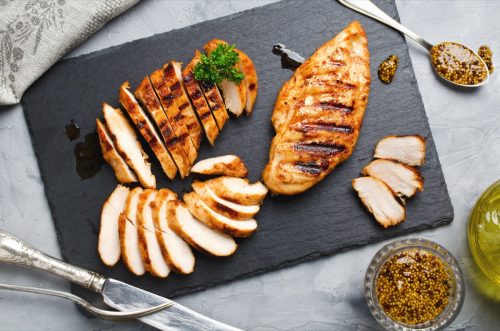
Most foods that are healthy for people on Ozempic are healthy in general—and lean protein tops the list.
“People on a weight loss journey should prioritize protein foods as part of a balanced, nutritious diet, and this is especially important for people on weight loss drugs who may experience weight loss at a rapid rate,” says Dominique R. Williams, MD, MPH, medical director and obesity specialist at Abbott. “As the weight decreases, the risk of losing 11 to 50 percent of muscle increases.” Counteract that with increased protein.
Whole grains
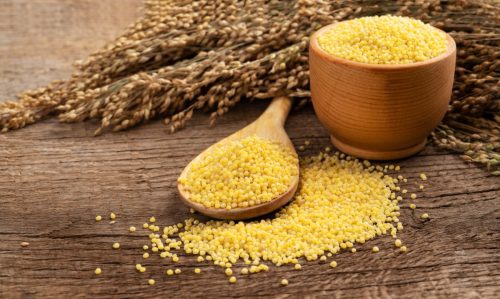
Swap any white bread and pasta for whole grains.
“Whole grains are a perfect complement to Ozempic due to their high fiber content, which aids in regulating blood sugar and promoting digestive health,” says Martha Theran, MS, RD/RDN Pritikin Longevity Center. “Additionally, whole grains provide essential protein, crucial for maintaining muscle mass, which can be a concern during weight loss.”
Vegetables
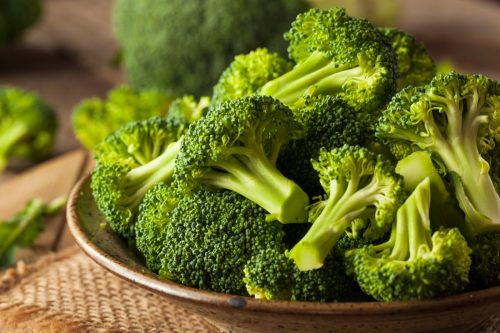
These are also great for their fiber and for getting you the nutrients your body needs. “It’s advisable to gradually increase your fiber intake to avoid potential nausea and heartburn, especially in some Ozempic users,” says Theran.
Lots of water

Maintaining an adequate fluid intake is imperative on Ozempic. In other words, it’s important to stay hydrated.
“You need to really be drinking a lot of water when you’re burning that much fat,” says Decotiis. “If you are not drinking enough water, your body won’t burn fat, and you’ll lose muscle.” Expect to double your intake.
RELATED: 7 Supplements to Avoid If You’re on Weight-Loss Drugs, Doctors Say.
Does Ozempic Make Food Taste Bad?
Some Ozempic users, but not all, say the drug changes the way certain foods taste. According to Drugs.com, common claims include that foods taste too salty or bitter or that they have a metallic taste or a sulfuric taste. Mouth dryness is also common.
Do You Still Need to Exercise On Ozempic To Lose Weight?
You should continue to exercise on Ozempic, especially with resistance training.
“It is well known that there is a loss of lean body mass during the weight loss journey on these medications,” says Warner. “It is also important to note that one of the primary determinants of your resting metabolic rate is your amount of skeletal muscle.”
Hitting the gym will allow you to reach weight loss goals faster and maintain a healthy amount of muscle.
FAQ
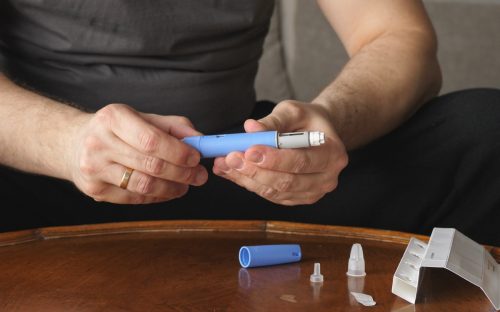
Can you eat cheese on Ozempic?
You can! “The only reason you cannot eat cheese is if you are allergic to one of the proteins and milk or sensitive, like whey and casein,” says registered dietitian Kim Shapira.
You may want to limit your intake due to unpleasant side effects like gas, bloating, diarrhea, or constipation. “But not everybody is sensitive,” she adds.
Can you eat bread on Ozempic?
You can eat bread on Ozempic, though whole-grain options are suggested.
“For any diet and on any medication, it is important to avoid highly refined bread with high levels of sugar,” says Warner. “Whole grain bread that is made fresh and without preservatives and other chemicals is fine.”
Can you eat sweets on Ozempic?
You can if you want, but it may not be best. “The goal for most people on this drug is to control blood glucose with a secondary goal of weight loss,” says Warner. “Taking Ozempic to be able to eat sweets is not logical—thankfully, Ozempic usually controls cravings for such foods, and it becomes a moot point.”
Conclusion
Before starting Ozempic or a similar drug, consult with your doctor to ensure it’s the best course of action for you. Once you’ve started the drug, continue to work with a professional to maintain a healthy diet and exercise routine. For more health and wellness advice, visit Best Life again soon.
Best Life offers the most up-to-date information from top experts, new research, and health agencies, but our content is not meant to be a substitute for professional guidance. When it comes to the medication you’re taking or any other health questions you have, always consult your healthcare provider directly.
- Source: The New England Journal of Medicine: Once-Weekly Semaglutide in Adults with Overweight or Obesity
- Source: FDA Approves New Drug Treatment for Chronic Weight Management, First Since 2014
- Source: Mayo Clinic: Chart of high-fiber foods
- Source: Nature Reviews Nephrology: High salt intake as a driver of obesity